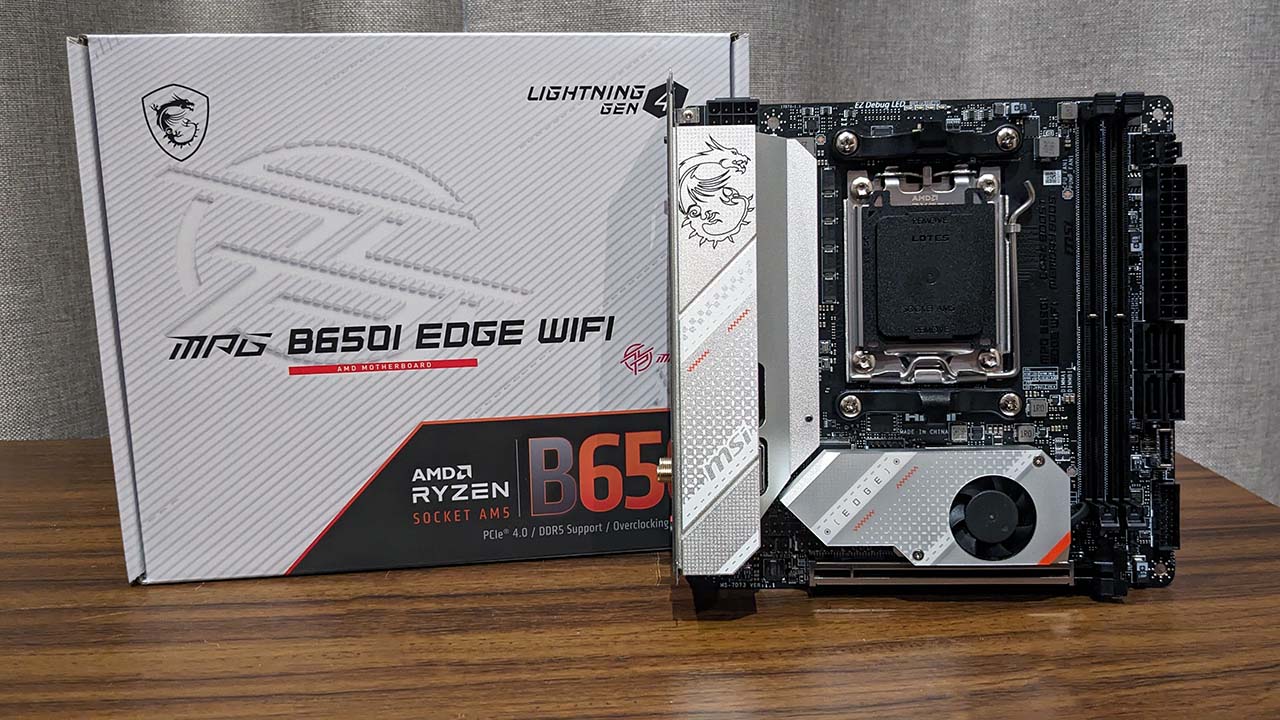Our Verdict
The MSI MPG B650I Edge's good value for money, plus the inclusion of 20Gbps USB and four SATA ports give it some key expansion capabilities. It's sure to have years of upgrade potential ahead of it, though the lack of any Gen 5 support could count against it in times to come.
For
- Four SATA ports
- Rear USB 20Gbps port
- Good value for its feature set
Against
- Lacks Gen 5 SSD and GPU support
- Sadly necessary chipset fan
PC Gamer's got your back
Devotees of the Mini-ITX form factor have lots of options to choose from, from the entry level to the high end, with multiple platforms and chipset options. ITX has displaced Micro ATX as the preeminent small form factor.
ITX has displaced Micro ATX as the preeminent small form factor.
I'm very much a Mini-ITX fan, and I've had the pleasure of testing multiple mini motherboards recently; first there was the ASRock Z790I Lightning and now the MSI MPG B650I Edge WiFi. As the name suggests, it's an AMD B650 board that aims to strike a balance between affordability and a decent feature set.
I like the look of the board. It'll blend in with black or white themed builds. It supports Ryzen 7000 and 8000-series processors, and will surely receive BIOS updates allowing it to run upcoming Zen 5 CPUs too. Its two memory slots support up to 128GB of memory at speeds of DDR5-7200, although DDR5-6000 or a touch above remains the sweet spot for the AM5 platform, because you'll be sticking to the optimal 1:1 RAM and memory controller ratio.
The board includes an 8+2+1 phase VRM with 80a stages. That's not extreme compared to some of the VRM systems you'll see on boards built for Intel 14th Gen processors, but It's easily sufficient to run a Ryzen 9 7950X, which means any other AM5 CPU, including X3D models will run on the Edge without a hitch. The VRM heatsink is quite chunky, meaning potential buyers will need to make sure your choice of cooler will fit, though that's an issue common to all ITX boards.
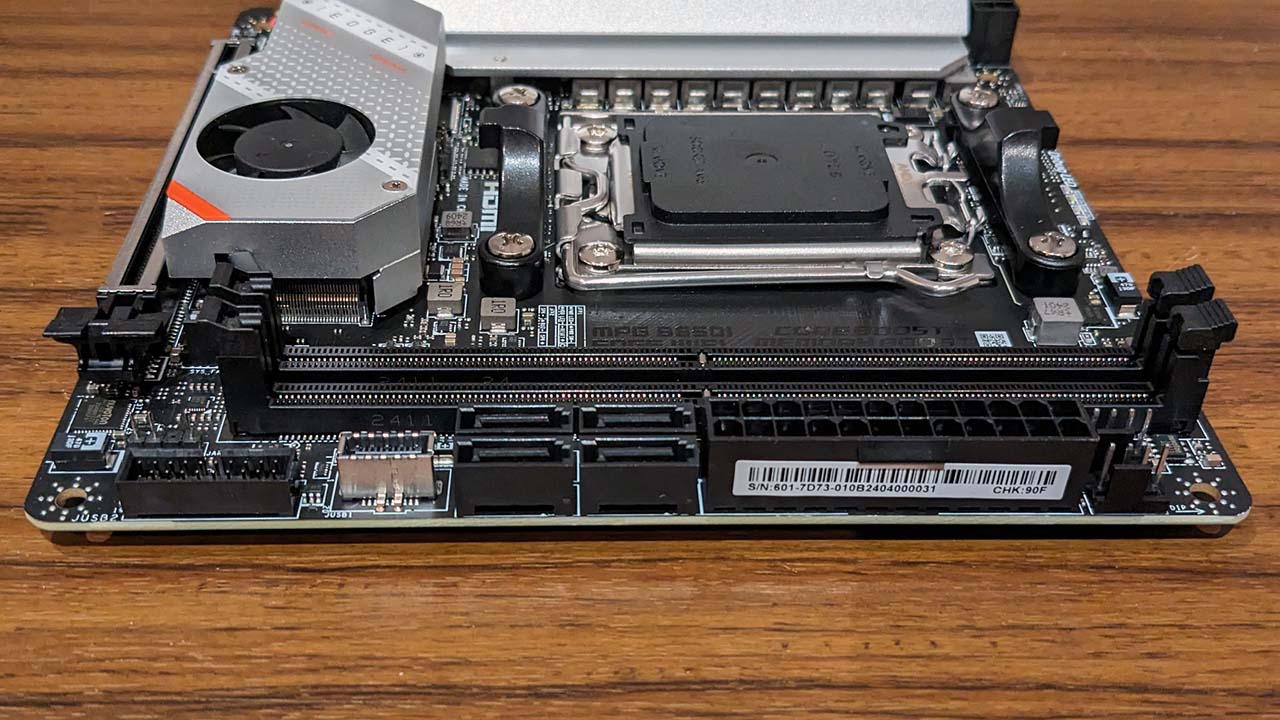
Socket: AMD AM5
CPU compatibility: AMD Ryzen 7000 / 8000-series processors
Form factor: Mini-ITX
Memory support: DDR5-7200+(OC), up to 128GB
Storage: 2x M.2, 4x SATA
USB: Up to 1x USB 20Gbps, 4x USB 10Gbps, 4x USB 5Gbps, 2x USB 2.0
Display: 1x HDMI 2.1
Networking: Realtek RTL8125BG 2.5G LAN, AMD WiFi 6E
Audio: Realtek ALC4080
Price: $259 / £199 / AU$349
The board comes with a PCIe Gen 4 x16 slot and a pair of Gen 4 M.2 slots, one of which is on the rear of the board. If you want Gen 5 SSD and GPU support, you'll have to look to B650E or X670E, though Gigabyte's competing B650i Aorus Ultra does include a single Gen 5 SSD slot. Not that Gen 5 SSDs are a must have for gamers right now.
It's nice to see four SATA ports. With PCB space at a premium, and M.2 taking over, SATA ports are becoming rarer, with many ITX boards including just two. If you're after a board with the ability to support several SATA SSDs or hard drives, there are fewer options than you might expect.
You might have noticed that the chipset and SSD heatsink has an integrated fan. Yuck. But it is a necessary evil in this case. A single chipset B650 board with its 7W TDP can be cooled passively, but when you add a high performance M.2 SSD as well, a small ITX sized heatsink can't keep both cool without some help. Luckily it is quiet in general operation, though you might need to tune the fan curve in the BIOS depending on your accompanying graphics card (if any) and the airflow characteristics of your case.
The key controllers aren't bad at all for a board at this price point. You'll get Realtek ALC4080 audio, Realtek 2.5G LAN, and AMD RZ616 WiFi 6E.
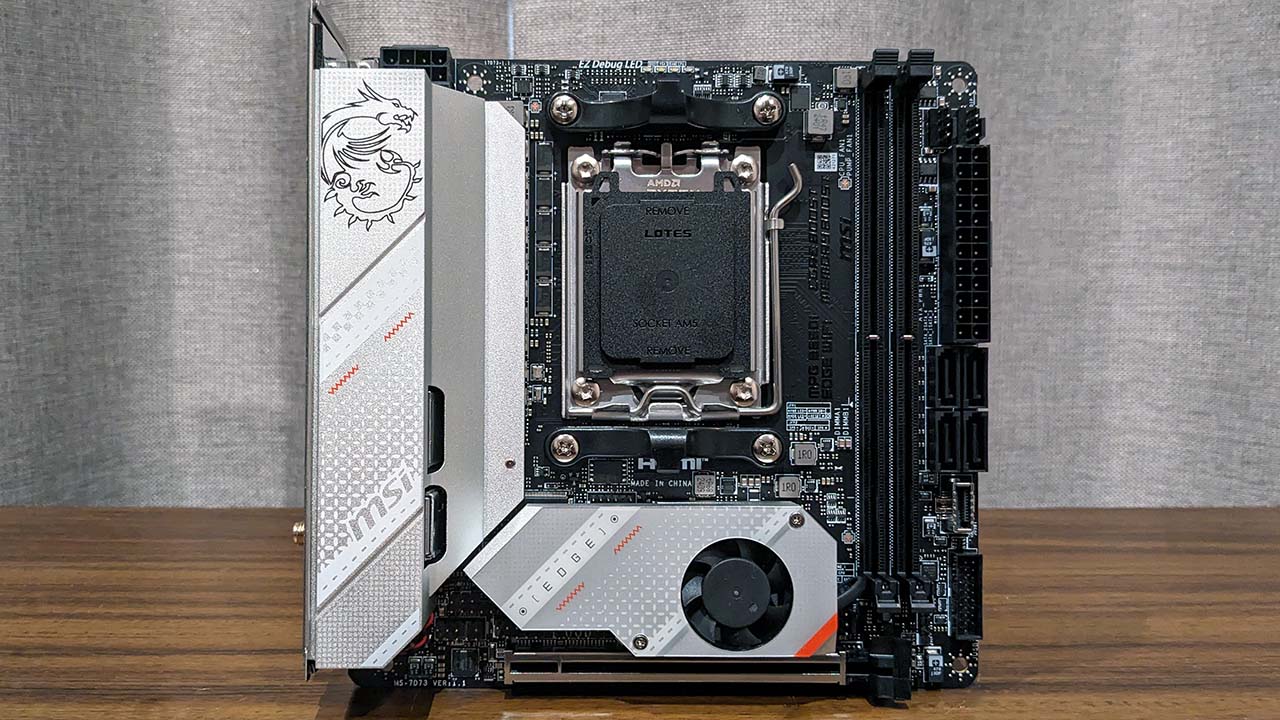

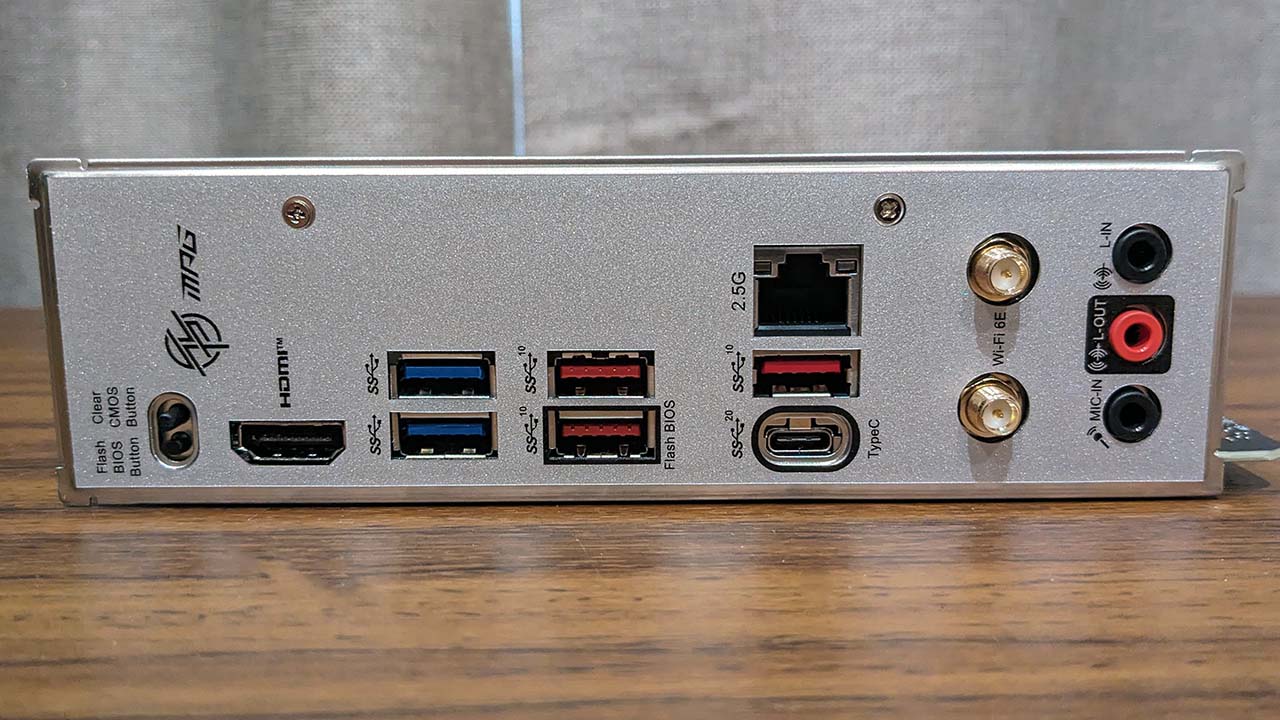
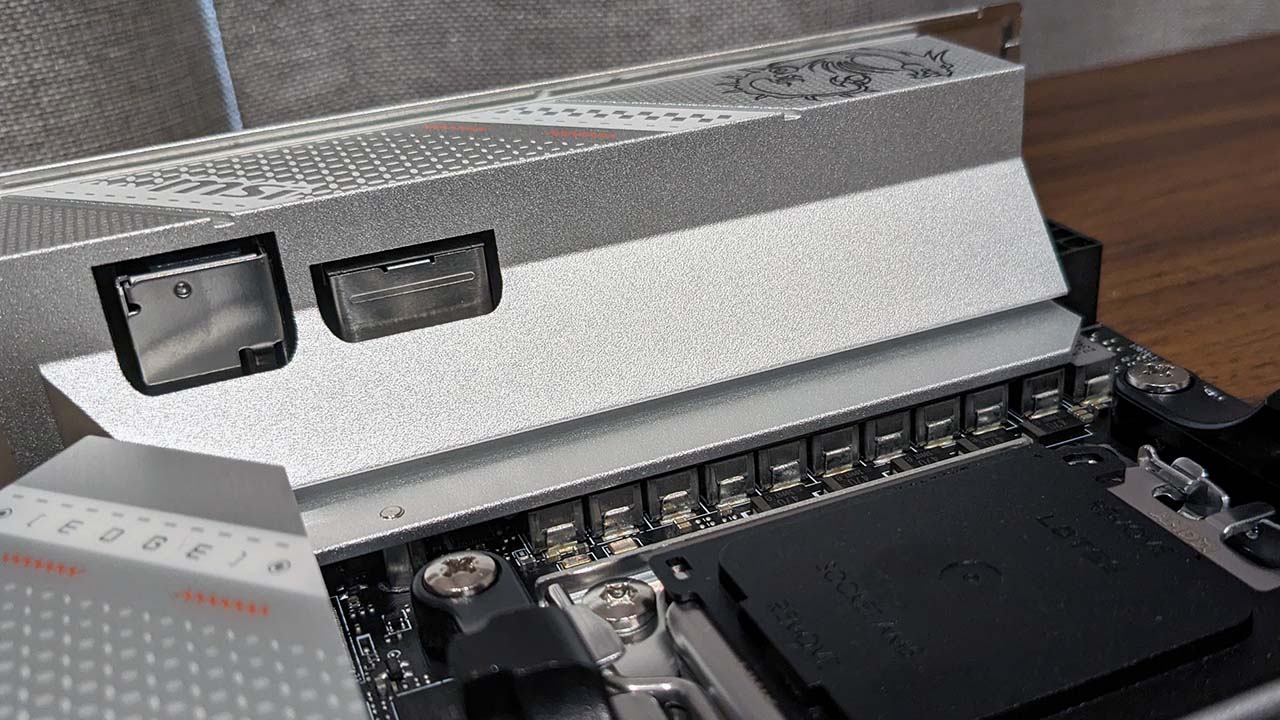
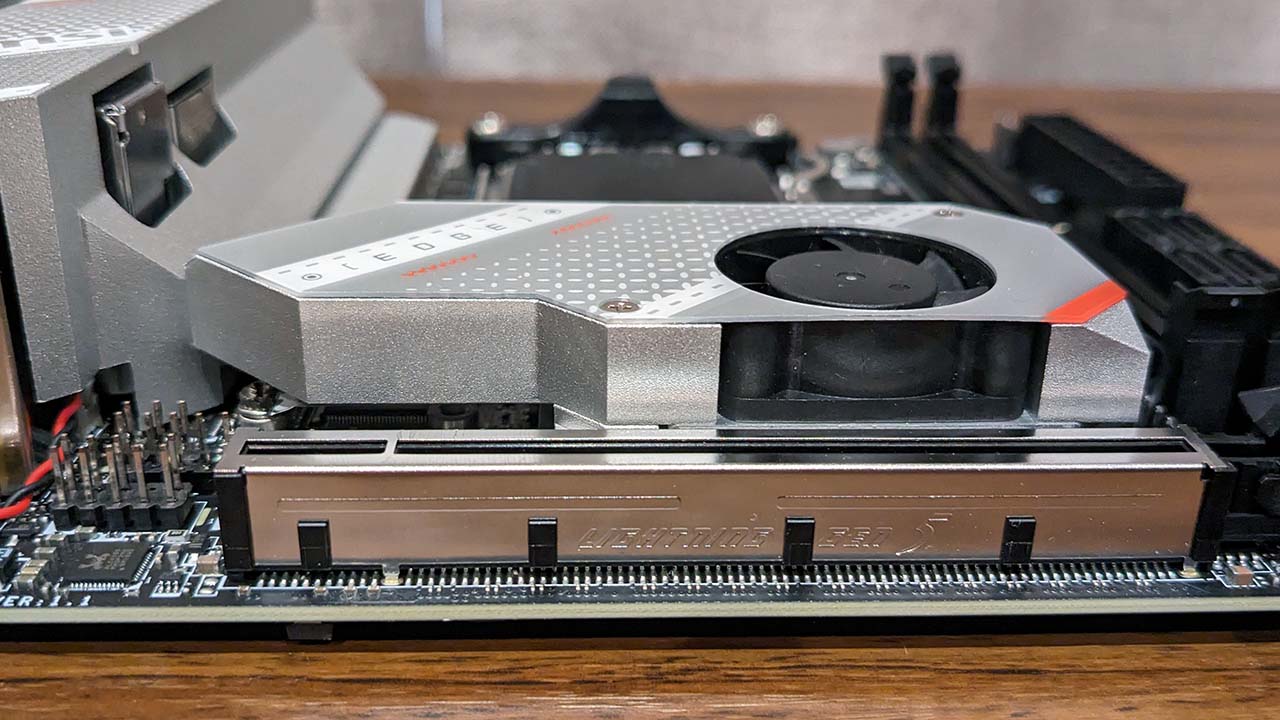
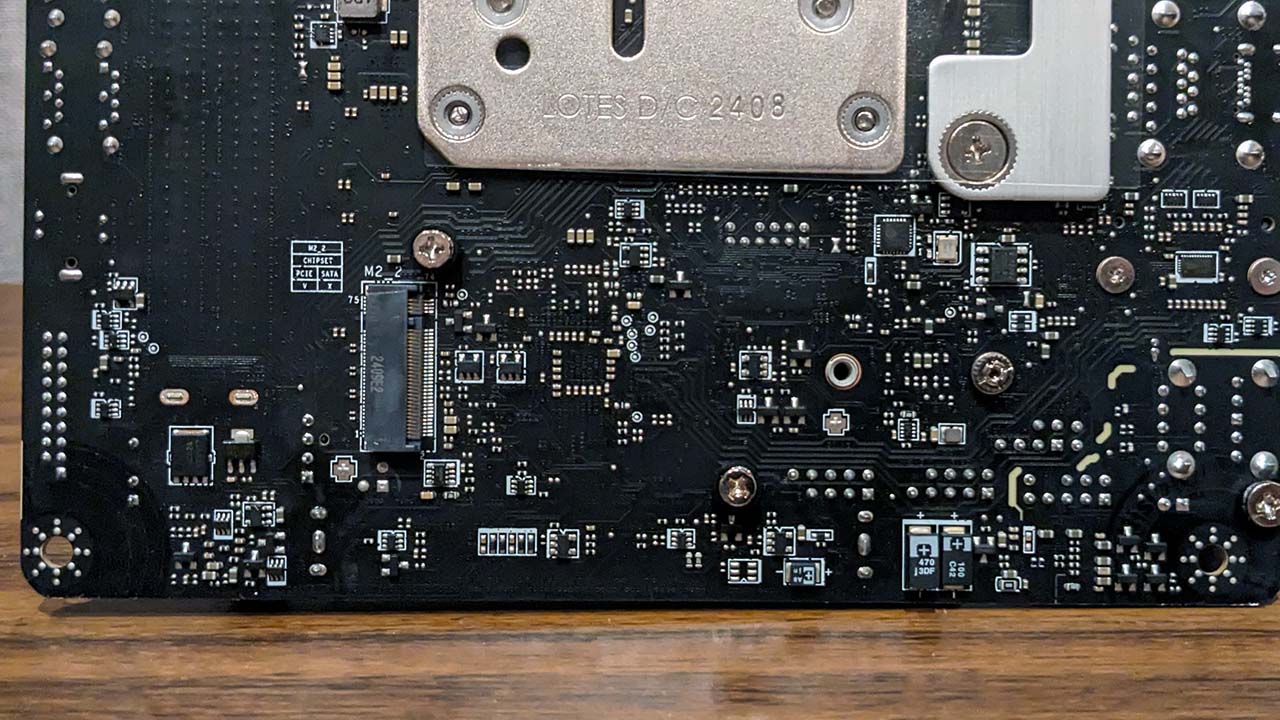
The rear I/O is fairly typical for an ITX board, which can't incorporate high numbers of USB ports. I am pleased to see a 20Gbps Type-C port. It's joined by three 10GBps ports and a pair of 5Gbps ports. A couple of basic USB 2.0 ports for a keyboard and mouse would be nice, but there is the option for a front-connected pair of USB 2.0 ports, a pair of 5Gbps ports and a single Type-C 10Gbps port. At least with that rear 20Gbps port, you can connect a speedy dock or a hub to add some more USB ports if you need them.
System Performance
Gaming Performance
CPU: AMD Ryzen 9 7950X
Graphics: Nvidia GeForce RTX 4090 Founders Edition
RAM: 2x 16GB G.Skill Trident Z5 DDR5-6000 C36
Storage: 2TB Kingston KC3000
Cooling: Cooler Master PL360 Flux 360mm AIO
PSU: Corsair HX1000i
Performance wise, the board ended up performing a little bit behind some of the other B650 boards I've tested. I can't really give a reason for that other than to suggest it was due to my 7950X sample downclocking by a tad more than usual when it hit its 95°C threshold. That bears out when looking at the on-par gaming tests which aren't as CPU limited. The VRM temperatures were well within limits, so I would not put these small deficits down to the board itself.
In summary, I was generally impressed by the MSI MPG B650I Gaming Edge. I quite like its aesthetic, though it's a bit sad to see chipset fans make a return to many SFF boards. You can thank hot M.2 drives for that. Luckily, the little MSI fan isn't obtrusive, and its speed can be controlled in the BIOS.
✅You want 20Gbps USB support: Many boards in this price range lack 20Gbps USB, making the MSI B650i Edge one of few choices if you plan to use a USB dock or hub.
✅ You want four SATA ports: Mini ITX boards with four SATA ports are becoming rare, but SATA is still useful. The MSI B650i Edge is good option for file hoarders.
❌ You must have Gen 5 SSD and GPU support: You'll need to look at B650E or X670E options if you want all-round PCIe Gen 5 support.
It's got a good set of controllers. ALC4080 audio is welcome over cheap ALC897, while WiFi 6E and 2.5G LAN are pretty standard these days. It's the inclusion of a Type-C 20Gbps USB port and four SATA ports that give the MSI a well balanced feature set for its $259 / £199 / AU$349 asking price.
If I had to nitpick, I'd like to see a DisplayPort for use with a Ryzen 8000G-series processor. The single HDMI 2.1 port is the bare minimum.
If you're after an affordable AMD socket AM5 option, this affordable wee MSI deserves consideration. It does lack Gen 5 support which doesn't mean much right now, but might in the years ahead. It's sure to support Zen 5 CPUs and probably Zen 6 CPUs as well. Depending on what AMD launches, I don't think I'd go thrashing a possible 32-core CPU on any AM5 Mini-ITX boards, though, that might be pushing the VRMs just a little too hard.
If your SFF motherboard requires ports for storage, you want 20Gbps USB and you want a solid upgrade path, then this MSI might just have the edge.
The MSI MPG B650I Edge's good value for money, plus the inclusion of 20Gbps USB and four SATA ports give it some key expansion capabilities. It's sure to have years of upgrade potential ahead of it, though the lack of any Gen 5 support could count against it in times to come.

Chris' gaming experiences go back to the mid-nineties when he conned his parents into buying an 'educational PC' that was conveniently overpowered to play Doom and Tie Fighter. He developed a love of extreme overclocking that destroyed his savings despite the cheaper hardware on offer via his job at a PC store. To afford more LN2 he began moonlighting as a reviewer for VR-Zone before jumping the fence to work for MSI Australia. Since then, he's gone back to journalism, enthusiastically reviewing the latest and greatest components for PC & Tech Authority, PC Powerplay and currently Australian Personal Computer magazine and PC Gamer. Chris still puts far too many hours into Borderlands 3, always striving to become a more efficient killer.
